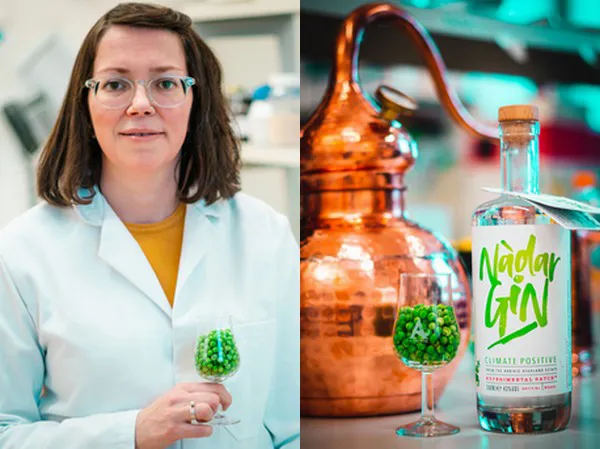The world’s first “climate-positive” gin has been created by UK scientists — using the humble garden pea. Five years of research at Abertay University and the James Hutton Institute in Scotland, in collaboration with Arbikie Distillery, has culminated in today’s release of new gin Nàdar.
Created by Arbikie’s Master Distiller, PhD student Kirsty Black, each 700ml bottle of Nàdar has a carbon footprint of -1.54 kg CO2e (carbon dioxide equivalent), meaning it avoids more carbon dioxide emissions than it creates. This environmental performance — significantly better than traditional wheat gins — is mainly achieved by utilising all useful components of the peas from the dehulling (de-skinning) and distilling process, to create home-grown animal feed.

It also takes advantage of the peas’ natural ability to source essential nitrogen for growth from the atmosphere through a process known as ‘biological nitrogen fixation’, negating the need for environmentally-damaging synthetic fertilisers. In addition, during harvesting, some nitrogen is left behind in-field in crop residues, improving soil fertility and function for the next crop in the rotation, thereby further reducing the need for synthetic fertilisers.
During distilling, a by-product known as ‘pot ale syrup’ is created from the leftover pea protein and spent yeast, and this can be used as a highly nutritious animal feed. The aim is to offset the high environmental costs of importation of animal feeds, which are most often derived from soybean and commonly sourced from cleared rainforest and cerrado regions.
The first batch of Arbikie pea gin pot-ale is currently being used to feed cows on a farm neighbouring the distillery, which is based near Montrose.
Black’s PhD at Abertay University and the James Hutton Institute is focused on exploring the potential of pulses such as peas and beans as an environmentally sustainable feedstock to the brewing and distilling industries. The research team is also working to investigate whether pot-ale protein can be isolated and used as a source of food for humans.
Black said the finished gin product is flavoured using natural botanicals, plus lemongrass and citrus leaf, contributing to a “fresh and fruity” aroma. She added: “At Arbikie, everything we do is dictated by the seasons and our geographical location. Year on year we see the weather, harvest timings and crop quality change; all highlighting the need to address the climate crisis now. By producing the world’s first climate positive gin, we are taking initial steps towards improving our environmental impact, while demonstrating what can be achieved when like-minded researchers and businesses come together.”
For more information:
Bernardo Rodriguez-Salcedo
James Hutton Institute
Tel: +44 (0)1224 395089
bernardo.rodriguez-salcedo@hutton.ac.uk
